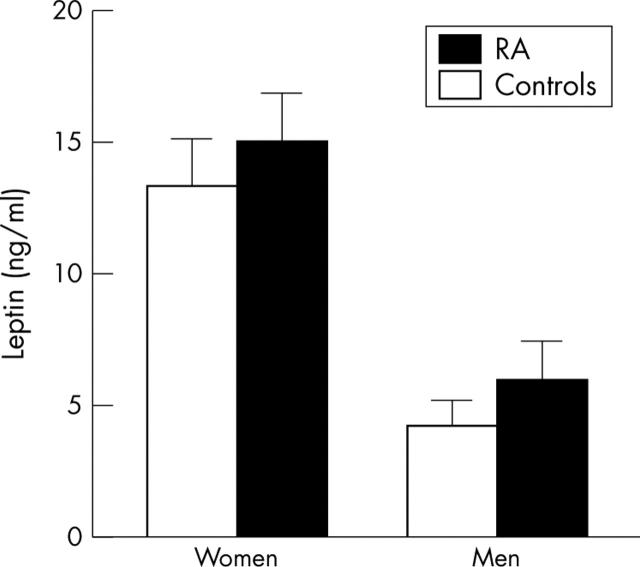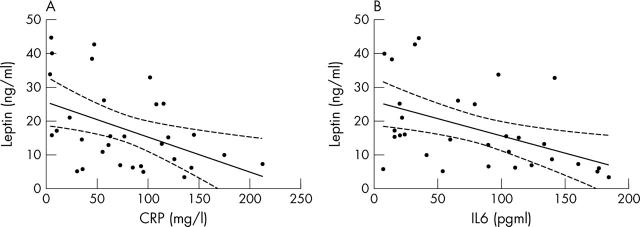Abstract
Background: Leptin regulates food intake and modulates immunity and inflammation. A positive feedback mechanism has been described between tumour necrosis factor (TNF) and leptin, and it has been suggested that leptin potentiates inflammation in patients with rheumatoid arthritis (RA).
Objective: To assess whether inflammation correlates with leptin concentrations in patients with RA, and whether anti-TNF treatment modulates leptin concentrations in these patients.
Methods: Leptin, IL6 and CRP were measured (at baseline and after 2 weeks of treatment) in the blood of 31 patients with RA starting either anti-TNF treatment or placebo, and in 18 healthy controls.
Results: In patients with RA, plasma leptin concentrations at baseline correlated inversely with the degree of inflammation as assessed by C reactive protein (CRP; rs2 = 0.21, p<0.01) or interleukin (IL) 6 concentrations (rs2 = 0.22, p<0.008). Mean (SD) leptin concentrations did not differ between patients with RA and controls (6.0 (4.6) v 4.2 (2.8) ng/ml in men; 15.1 (7.9) v 13.4 (5.2) ng/ml in women). Short course anti-TNF treatment for 2 weeks did not modify leptin concentrations, despite significant reduction of CRP and IL6.
Conclusion: A significant inverse correlation between inflammation and leptin concentrations was found in patients with active RA, although plasma leptin concentrations did not significantly differ from those in healthy controls. This suggests that active chronic inflammation may lower plasma leptin concentrations. Two weeks' treatment with anti-TNF did not change plasma leptin concentrations and longer treatment may be needed to see an effect on leptin.
Full Text
The Full Text of this article is available as a PDF (71.9 KB).
Figure 1.
Circulating leptin concentration in patients with RA (n = 31) and controls (n = 18). No significant differences were found for men or for women.
Figure 2.
Circulating leptin concentrations in patients with RA (n = 31) correlate negatively with (A) CRP (rs2 = 0.21, p<0.01) and (B) IL6 (rs2 = 0.22, p<0.008). A linear regression test was used.
Selected References
These references are in PubMed. This may not be the complete list of references from this article.
- Ahima R. S., Flier J. S. Leptin. Annu Rev Physiol. 2000;62:413–437. doi: 10.1146/annurev.physiol.62.1.413. [DOI] [PubMed] [Google Scholar]
- Anders H. J., Rihl M., Heufelder A., Loch O., Schattenkirchner M. Leptin serum levels are not correlated with disease activity in patients with rheumatoid arthritis. Metabolism. 1999 Jun;48(6):745–748. doi: 10.1016/s0026-0495(99)90174-9. [DOI] [PubMed] [Google Scholar]
- Arnalich F., López J., Codoceo R., Jim nez M., Madero R., Montiel C. Relationship of plasma leptin to plasma cytokines and human survivalin sepsis and septic shock. J Infect Dis. 1999 Sep;180(3):908–911. doi: 10.1086/314963. [DOI] [PubMed] [Google Scholar]
- Baumann H., Morella K. K., White D. W., Dembski M., Bailon P. S., Kim H., Lai C. F., Tartaglia L. A. The full-length leptin receptor has signaling capabilities of interleukin 6-type cytokine receptors. Proc Natl Acad Sci U S A. 1996 Aug 6;93(16):8374–8378. doi: 10.1073/pnas.93.16.8374. [DOI] [PMC free article] [PubMed] [Google Scholar]
- Bokarewa M., Bokarew D., Hultgren O., Tarkowski A. Leptin consumption in the inflamed joints of patients with rheumatoid arthritis. Ann Rheum Dis. 2003 Oct;62(10):952–956. doi: 10.1136/ard.62.10.952. [DOI] [PMC free article] [PubMed] [Google Scholar]
- Bornstein S. R., Licinio J., Tauchnitz R., Engelmann L., Negrão A. B., Gold P., Chrousos G. P. Plasma leptin levels are increased in survivors of acute sepsis: associated loss of diurnal rhythm, in cortisol and leptin secretion. J Clin Endocrinol Metab. 1998 Jan;83(1):280–283. doi: 10.1210/jcem.83.1.4610. [DOI] [PubMed] [Google Scholar]
- Busso Nathalie, So Alexander, Chobaz-Péclat Véronique, Morard Carole, Martinez-Soria Eduardo, Talabot-Ayer Dominique, Gabay Cem. Leptin signaling deficiency impairs humoral and cellular immune responses and attenuates experimental arthritis. J Immunol. 2002 Jan 15;168(2):875–882. doi: 10.4049/jimmunol.168.2.875. [DOI] [PubMed] [Google Scholar]
- Faggioni R., Feingold K. R., Grunfeld C. Leptin regulation of the immune response and the immunodeficiency of malnutrition. FASEB J. 2001 Dec;15(14):2565–2571. doi: 10.1096/fj.01-0431rev. [DOI] [PubMed] [Google Scholar]
- Härle P., Pongratz G., Weidler C., Büttner R., Schölmerich J., Straub R. H. Possible role of leptin in hypoandrogenicity in patients with systemic lupus erythematosus and rheumatoid arthritis. Ann Rheum Dis. 2004 Jul;63(7):809–816. doi: 10.1136/ard.2003.011619. [DOI] [PMC free article] [PubMed] [Google Scholar]
- Lappas Martha, Yee Kirin, Permezel Michael, Rice Gregory E. Sulfasalazine and BAY 11-7082 interfere with the nuclear factor-kappa B and I kappa B kinase pathway to regulate the release of proinflammatory cytokines from human adipose tissue and skeletal muscle in vitro. Endocrinology. 2004 Nov 24;146(3):1491–1497. doi: 10.1210/en.2004-0809. [DOI] [PubMed] [Google Scholar]
- Loffreda S., Yang S. Q., Lin H. Z., Karp C. L., Brengman M. L., Wang D. J., Klein A. S., Bulkley G. B., Bao C., Noble P. W. Leptin regulates proinflammatory immune responses. FASEB J. 1998 Jan;12(1):57–65. [PubMed] [Google Scholar]
- Mutru O., Laakso M., Isomäki H., Koota K. Ten year mortality and causes of death in patients with rheumatoid arthritis. Br Med J (Clin Res Ed) 1985 Jun 15;290(6484):1797–1799. doi: 10.1136/bmj.290.6484.1797. [DOI] [PMC free article] [PubMed] [Google Scholar]
- Nishiya Koji, Nishiyama Mitsuru, Chang Angela, Shinto Atsushi, Hashimoto Kozo. [Serum leptin levels in patients with rheumatoid arthritis are correlated with body mass index]. Rinsho Byori. 2002 May;50(5):524–527. [PubMed] [Google Scholar]
- Otero Miguel, Gomez Reino Juan Jesús, Gualillo Oreste. Synergistic induction of nitric oxide synthase type II: in vitro effect of leptin and interferon-gamma in human chondrocytes and ATDC5 chondrogenic cells. Arthritis Rheum. 2003 Feb;48(2):404–409. doi: 10.1002/art.10811. [DOI] [PubMed] [Google Scholar]
- Ozata M., Ozdemir I. C., Licinio J. Human leptin deficiency caused by a missense mutation: multiple endocrine defects, decreased sympathetic tone, and immune system dysfunction indicate new targets for leptin action, greater central than peripheral resistance to the effects of leptin, and spontaneous correction of leptin-mediated defects. J Clin Endocrinol Metab. 1999 Oct;84(10):3686–3695. doi: 10.1210/jcem.84.10.5999. [DOI] [PubMed] [Google Scholar]
- Popa C., Netea M. G., Radstake T., Van der Meer J. W. M., Stalenhoef A. F. H., van Riel P. L. C. M., Barerra P. Influence of anti-tumour necrosis factor therapy on cardiovascular risk factors in patients with active rheumatoid arthritis. Ann Rheum Dis. 2004 Jul 1;64(2):303–305. doi: 10.1136/ard.2004.023119. [DOI] [PMC free article] [PubMed] [Google Scholar]
- Tokarczyk-Knapik Anita, Nowicki Michał, Wyroślak Janusz. Zaleznoś pomiedzy stezeniem leptyny w surowicy krwi a masa tkanki tłuszczowej u chorych na reumatoidalne zapalenie stawów. Pol Arch Med Wewn. 2002 Aug;108(2):761–767. [PubMed] [Google Scholar]
- van Crevel Reinout, Karyadi Elvina, Netea Mihai G., Verhoef Hans, Nelwan Ronald H. H., West Clive E., van der Meer Jos W. M. Decreased plasma leptin concentrations in tuberculosis patients are associated with wasting and inflammation. J Clin Endocrinol Metab. 2002 Feb;87(2):758–763. doi: 10.1210/jcem.87.2.8228. [DOI] [PubMed] [Google Scholar]




